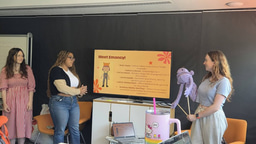Reflections: Local Outreach Project, Weeks 1 & 2
This week, we began delivering our session to the students at our first school. The children, while incredibly hyper, were much more engaged than I’d anticipated, and approached the mystery challenge we presented to them with lots of enthusiasm. They were good at sharing ideas between classmates, and held short but intense debates on their disagreements about who the culprit could be. While the code-breaking challenges didn’t always come naturally to them, they were eager to continue looking for clues, and had a creative approach regarding links between clues that we hadn’t set up intentionally, which made me consider that we could have gone further with the clues we presented them!
The biggest challenge I faced was controlling the level of energy in the room. After a full day of school, they needed to move around, rather than just listening to a teacher for another hour. This further highlighted the need for varied extra-curriculars that go beyond the curriculum not only in content, but in format, to allow them to move and have informal interactions with the other children. In our case, they were working towards a common goal of solving a mystery, contrasting with the typical nature of education where children are encouraged to compete against each other to achieve the best grades individually. We have also integrated games into our session plans, having carefully considered the level of energy that the game fosters, and the points in the session that each game will be most effective in managing the children’s restlessness. We have adapted our resources for future sessions by simplifying worksheets, rather than presenting the children an overwhelming number of boxes to fill all at once. We also noted a clear disparity in the speed at which the children complete tasks, so will give worksheets to give to the children who finish faster, to ensure they have something to do while others finish without distracting them, and so we don’t have to rush those who are slower.
The research aspect of our project has also been going well alongside the delivery of our programme: we were given feedback by our research supervisor regarding our research proposal, and now have a much clearer idea of our aims and objectives with this research. This coming week will be focused around reaching out to schools and spokespeople, to gauge opinions on the provision of extra-curriculars, and identify any key limiting factors to their equal distribution. This will be backed by continued reviews of existing literature on the subject.
Outside of our project, I’ve enjoyed the experience of Oxford without having a degree consuming all my time - I’ve really been able to appreciate the city and all the opportunities it has to offer. I’ve made the most of the time to build on my own hobbies and extra-curriculars, and attended dance classes in Bicester to prepare me for University team trials at the beginning of term! Inspired by a talk from Alexander Betts on the town-and-gown divide, I’m looking forward to continuing to explore areas outside of central Oxford, and to appreciate the community that exists here beyond the university itself.





Please sign in
If you are a registered user on Laidlaw Scholars Network, please sign in